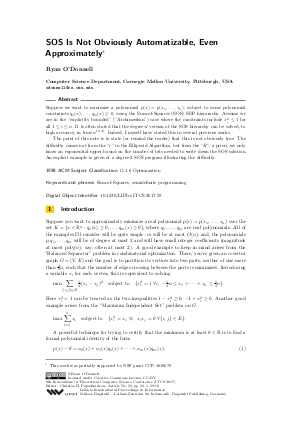SOS Is Not Obviously Automatizable, Even Approximately
Author Ryan O'Donnell
-
Part of:
Volume:
8th Innovations in Theoretical Computer Science Conference (ITCS 2017)
Part of: Series: Leibniz International Proceedings in Informatics (LIPIcs)
Part of: Conference: Innovations in Theoretical Computer Science Conference (ITCS) - License:
 Creative Commons Attribution 3.0 Unported license
Creative Commons Attribution 3.0 Unported license
- Publication Date: 2017-11-28
File

PDF
LIPIcs.ITCS.2017.59.pdf
- Filesize: 470 kB
- 10 pages
Document Identifiers
Subject Classification
Keywords
- Sum-of-Squares
- semidefinite programming
Metrics
- Access Statistics
-
Total Accesses (updated on a weekly basis)
0Document
0Metadata
Abstract
Suppose we want to minimize a polynomial p(x) = p(x_1,...,x_n), subject to some polynomial constraints q_1(x),...,q_m(x) >_ 0, using the Sum-of-Squares (SOS) SDP hierarachy. Assume we are in the "explicitly bounded" ("Archimedean") case where the constraints include x_i^2 <_ 1 for all 1 <_ i <_ n. It is often stated that the degree-d version of the SOS hierarchy can be solved, to
high accuracy, in time n^O(d). Indeed, I myself have stated this in several previous works.
The point of this note is to state (or remind the reader) that this is not obviously true. The difficulty comes not from the "r" in the Ellipsoid Algorithm, but from the "R"; a priori, we only know an exponential upper bound on the number of bits needed to write down the SOS solution. An explicit example is given of a degree-2 SOS program illustrating the difficulty.
Cite As Get BibTex
Ryan O'Donnell. SOS Is Not Obviously Automatizable, Even Approximately. In 8th Innovations in Theoretical Computer Science Conference (ITCS 2017). Leibniz International Proceedings in Informatics (LIPIcs), Volume 67, pp. 59:1-59:10, Schloss Dagstuhl – Leibniz-Zentrum für Informatik (2017)
https://doi.org/10.4230/LIPIcs.ITCS.2017.59
BibTex
@InProceedings{odonnell:LIPIcs.ITCS.2017.59,
author = {O'Donnell, Ryan},
title = {{SOS Is Not Obviously Automatizable, Even Approximately}},
booktitle = {8th Innovations in Theoretical Computer Science Conference (ITCS 2017)},
pages = {59:1--59:10},
series = {Leibniz International Proceedings in Informatics (LIPIcs)},
ISBN = {978-3-95977-029-3},
ISSN = {1868-8969},
year = {2017},
volume = {67},
editor = {Papadimitriou, Christos H.},
publisher = {Schloss Dagstuhl -- Leibniz-Zentrum f{\"u}r Informatik},
address = {Dagstuhl, Germany},
URL = {https://drops.dagstuhl.de/entities/document/10.4230/LIPIcs.ITCS.2017.59},
URN = {urn:nbn:de:0030-drops-81980},
doi = {10.4230/LIPIcs.ITCS.2017.59},
annote = {Keywords: Sum-of-Squares, semidefinite programming}
}
Author Details
References
-
Farid Alizadeh. Interior point methods in semidefinite programming with applications to combinatorial optimization. SIAM Journal on Optimization, 5(1):13-51, 1995.

-
Sarah Allen, Ryan O'Donnell, and David Witmer. How to refute a random CSP. In Proceedings of the 56th Annual IEEE Symposium on Foundations of Computer Science, 2015.

-
Boaz Barak and David Steurer. Sum-of-squares proofs and the quest toward optimal algorithms. In Proceedings of the 2014 International Congress of Mathematicians. International Mathematical Union, 2014.

-
Charles Delorme and Svatopluk Poljak. Laplacian eigenvalues and the maximum cut problem. Mathematical Programming, 62(1-3):557-574, 1993.

-
Jack Edmonds. Systems of distinct representatives and linear algebra. Journal of Research of the National Bureau of Standards, 71B:241-245, 1967.

- Jeff Erickson. What is the actual time complexity of Gaussian elimination? http://cstheory.stackexchange.com/questions/3921/what-is-the-actual-time-complexity-of-gaussian-elimination, 2010.
-
Dima Grigoriev. Linear lower bound on degrees of Positivstellensatz calculus proofs for the parity. Technical Report IHES/M 68, Insitut des Hautes Études Scientifiques, 1999.

-
Dima Grigoriev. Complexity of Positivstellensatz proofs for the knapsack. Computational Complexity, 10(2):139-154, 2001.

-
Dima Grigoriev and Nicolai Vorobjov. Complexity of Null- and Positivstellensatz proofs. Annals of Pure and Applied Logic, 113(1):153-160, 2001.

-
Martin Grötschel, László Lovász, and Alexander Schrijver. The Ellipsoid Method and its consequences in combinatorial optimization. Combinatorica, 1(2):169-197, 1981.

-
Martin Grötschel, László Lovász, and Alexander Schrijver. Geometric Algorithms and Combinatorial Optimization. Springer-Verlag, 1988.

-
Amir Hashemi and Daniel Lazard. Sharper complexity bounds for zero-dimensional gröbner bases and polynomial system solving. International Journal of Algebra and Computation, 21(05):703-713, 2011.

-
Cédric Josz and Didier Henrion. Strong duality in Lasserre’s hierarchy for polynomial optimization. Optimization Letters, 10(1):3-10, 2016.

-
Manuel Kauers, Ryan O'Donnell, Li-Yang Tan, and Yuan Zhou. Hypercontractive inequalities via SOS, and the Frankl-Rödl graph. Discrete Analysis, 4, 2016.

-
Leonid Khachiyan. Polynomial algorithms in linear programming. USSR Computational Mathematics and Mathematical Physics, 20(1):53-72, 1980.

-
Jean Lasserre. Optimisation globale et théorie des moments. Comptes Rendus de l'Académie des Sciences, 331(11):929-934, 2000.

-
Jean Lasserre. Global optimization with polynomials and the problem of moments. SIAM Journal on Optimization, 11(3):796-817, 2001.

-
Monique Laurent. Sums of squares, moment matrices and optimization over polynomials. Emerging Applications of Algebraic Geometry, 149:157-270, 2009.

- László Lovász. Semidefinite programs and combinatorial optimization. In Recent advances in algorithms and combinatorics, pages 137-194. Springer New York, 2003. URL: http://dx.doi.org/10.1007/0-387-22444-0_6.
-
Yurii Nesterov. Squared functional systems and optimization problems, chapter 17, pages 405-440. Kluwer Academic Publishers, 2000.

- Ryan O'Donnell and Franklin Ta. Linear programming and semidefinite programming lecture 10 notes, 2011. URL: http://www.cs.cmu.edu/afs/cs.cmu.edu/academic/class/15859-f11/www/notes/lecture10.pdf.
-
Ryan O'Donnell and Yuan Zhou. Approximability and proof complexity. In Proceedings of the 24th Annual ACM-SIAM Symposium on Discrete Algorithms, pages 1537-1556, 2013.

-
Pablo Parrilo. Structured Semidefinite Programs and Semialgebraic Geometry Methods in Robustness and Optimization. PhD thesis, California Institute of Technology, 2000.

-
Lorant Porkolab and Leonid Khachiyan. On the complexity of semidefinite programs. Journal of Global Optimization, 10(4):351-365, 1997.

-
Motakuri Ramana. An exact duality theory for semidefinite programming and its complexity implications. Mathematical Programming, 77(1):129-162, 1997.

-
Claus Scheiderer. Sums of squares of polynomials with rational coefficients. Journal of the European Mathematical Society, 18(7):1495-1513, 2016.

-
Grant Schoenebeck. Linear level Lasserre lower bounds for certain k-CSPs. In Proceedings of the 49th Annual IEEE Symposium on Foundations of Computer Science, pages 593-602, 2008.

-
Naum Shor. Class of global minimum bounds of polynomial functions. Cybernetics, 23(6):731-734, 1987.

-
Kuduvally Swamy. On Sylvester’s criterion for positive-semidefinite matrices. IEEE Transactions on Automatic Control, 18(3):306-306, 1973.

-
Sergey Tarasov and Mikhail Vyalyi. Semidefinite programming and arithmetic circuit evaluation. Discrete Applied Mathematics, 156(11):2070-2078, 2008.

